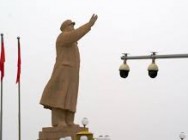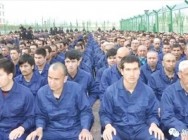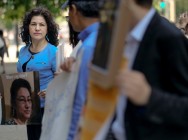Last Minute

- Conflict and Alliance: The US and China: A Centennial Dance: A Century of Relationship from 1900 to 2024
- CHINA RELATIONSEAST TURKESTAN PROBLEM AND TURKEY
- FRONTLINE China Undercover
- Elimination of “Uyghur Counter-Revolutionary Officials” in Academic Fields—Exact Quotes Translated from a Mandarin Audio File
- In Push for Trade Deal, Trump Administration Shelves Sanctions Over China’s Crackdown on Uighurs
- Dalai Lama’s 60th Anniversary Symposium: İlshat Hassan speech in English and Chinese
- Uyghur Detainees from Xinjiang ‘Placed in Nearly Every Prison’ in Shandong Province
- Shahrezad Ghayrat, Unrepresented Women
- Uighur Americans Speak Against China’s Internment Camps. Their Relatives Disappear.
- Rozinisa: The true story of the Uyghur girls in the prison

-

Conflict and Alliance: The US and China: A Centennial Dance: A Century of Relationship from 1900 to 2024
-

CHINA RELATIONSEAST TURKESTAN PROBLEM AND TURKEY
-

FRONTLINE China Undercover
-

Elimination of “Uyghur Counter-Revolutionary Officials” in Academic Fields—Exact Quotes Translated from a Mandarin Audio File
-

In Push for Trade Deal, Trump Administration Shelves Sanctions Over China’s Crackdown on Uighurs
-

Dalai Lama’s 60th Anniversary Symposium: İlshat Hassan speech in English and Chinese
Police Increase Checks of Uyghur Smartphone Users in Xinjiang
Police in three prefectures in northwest China’s restive Xinjiang region have stepped up and extended security checks of ethnic Uyghurs who use smartphones into the new year to ensure stability in the area, local police and Uyghur residents said.
Police in Hotan (in Chinese, Hetian) manned security checkpoints in Hotan for 24 hours when the new year began to check smartphones and other electronic devices that could connect to the Internet for Islamic extremist or religious texts and videos, said a Uyghur officer at Mokuyla Township Police Station in Hotan’s Guma (Pishan) county, who declined to give his name.
Uyghur residents in Kashgar (Kashi) and Aksu (Akesu) prefectures of Xinjiang also reported that police had increased their checks of young people with smartphones around the turn of the new year in the following the Paris terrorist attacks by Islamic extremists in November.
Police in Hotan have been conducting smartphone checks since last May. They are one of several measures, including daily patrols in villages and identification checks of worshippers at mosques in Uyghur areas of Xinjiang to prevent “extremist” activists and attacks and maintain stability.
Initially, police focused on checking young people’s smartphones, the Uyghur officer said, but increased manpower at the end of the year and beginning of 2016 to check everyone with the handsets.
“Whenever we started our operations in the daytime or at night, the auxiliary police and local village cadres also came to cooperate with us,” he told RFA’s Uyghur Service.
Authorities detained two young people in Lengger village who “illegally” tried to access websites to view religious content, he said.
Township police sent them to a political education camp, organized by the county law office, for 100 days so they could change what authorities consider extremist ideas and learn the Communist Party’s ethnic harmony rules and policy on religion, the officer said.
Local police had organized a special group in Hotan to check young people’s smartphones once a week since last May, the officer said, when users received messages from their service providers that various social media platforms would be unavailable on their handsets.
Abdumejit Akhon, a Uyghur businessman who owns a supermarket in Hotan, said on May 27, he received text and voice messages from his smartphone provider China Telecom that stated: “According to the guidance from the [Xinjiang] Uyghur Autonomous Regional Party Committee and government, Hotan prefecture decided to consolidate its telecommunication system and internet [service]. Therefore, all smartphone service for 17 social media platforms has been temporary stopped.”
The primary reasons for the service cut-off were to “clean” religious content and other material deemed extremist from the platforms and maintain stability in the Hotan region, the notice said.
Smartphone users in Hotan have not been able to use Wechat (Weixing), QQ or 17 other social media platforms since that time, he told RFA on Wednesday.
“Whenever someone enters the territory of Hotan prefecture from neighboring regions, Wechat and other social media platforms automatically do not work on smartphones,” Akhon said. “Speaking honestly, most Uyghur smartphone users have faced strict police controls during the last few years.”
Smartphones now ‘useless’
Because of the suspension of social media services, smartphones have become “useless” for some Uyghurs in Hotan, especially for businessmen who rely on them to order supplies, he said.
Before the restrictions, Akhon ordered all goods for his supermarket via the Internet and his Wechat Friends’ Circle service, he said. But now he must travel to Xinjiang’s regional capital Urumqi and Kashgar to place the orders.
“People can see the police checkpoints everywhere in Hotan,” he said, adding that passengers at the long-distance bus station, train station and airport must wait in long lines for security checks.
“If the police find any kind of text message or videos with religious content which have been viewed or sent by someone’s smartphone, it causes big trouble [and] the smartphone owners are detained on the spot,” Akhon said.
Rumors are circulating among Uyghurs in Hotan that the police have special smartphone checking software that can recover deleted documents off the device’s memory if they had been previously downloaded via the Internet, he said.
Because of this, many Uyghurs have switched to using simple cell phones which they believe are more secure, he said.
Local cadres and “stability work team” officials in villages also check young peoples’ smartphones and other electronic devices regularly, said a Uyghur cadre in Aksu prefecture’s Awat (Awati) county.
“If we find [them] viewing some Internet materials that stir their ethnic feelings and local nationalistic ideas, we advise them or detain them at the political education camp until they change,” said the cadre, who declined to give his name.
“But if we find that someone has viewed or downloaded extremist religious texts and videos on the Internet, we confiscate their smartphones or computers and detain them on the spot,” he said. “They will be put on trial and jailed according to the law.”
Authorities detained three high-school students under 17 last year in a the village in Tamtoghraq township where he was working as part of a stability work, he said.
“The three young boys were detained on the spot just because they watched an extremist religious video on their smartphones, he said. “They received jail sentences ranging from six months to 15 years.”
Rights groups routinely accuse Chinese authorities of heavy-handed rule in Xinjiang, including violent police raids on Uyghur households, restrictions on Islamic practices, and curbs on the culture and language of the Uyghur people.
The mostly Muslim Uyghurs have complained about pervasive ethnic discrimination, religious repression, and cultural suppression by Beijing under its series of “strike hard” campaigns in Xinjiang in the name of fighting separatism, religious extremism and terrorism.
Authorities rolled out the strike hard campaign following a deadly suicide bombing in May 2014 in the regional capital Urumqi, which they blamed on Uyghur separatists.
The campaign has included police raids on Uyghur households, restrictions on Islamic practices and curbs on the culture and language of the Uyghur people.
Experts outside China, however, say Beijing has exaggerated the threat from Uyghur separatists, and that domestic policies are responsible for an upsurge in violence that has left hundreds dead since 2012.
Reported by Eset Sulaiman for RFA’s Uyghur Service. Translated by Eset Sulaiman. Written in English by Roseanne Gerin.
http://www.rfa.org/english/news/uyghur/police-increase-checks-of-smartphone-users-in-xinjiang-01082016133532.html
RELATED NEWS












